“It’s just an extraordinary moment in business education.”
Senior Associate Dean Paul Spindt is describing the historic changes impacting management education in general, but he could just as well be referring to the historic changes at the A. B. Freeman School of Business.
For the first time in seven years, since Hurricane Katrina devastated New Orleans and decimated the business school faculty, the Freeman School has embarked on a major faculty recruiting initiative, one that promises not just to replace the dozen tenured and tenure-track faculty members lost in the aftermath of the storm but to take the business school faculty to an even higher level.
Last October, Tulane President Scott Cowen, with the support of the provost, formally approved the Freeman School’s proposal to hire 15 additional tenured or tenure-track professors in the next few years. One of the biggest hiring initiatives in school history, the plan will grow the ranks of Freeman’s research-active faculty by an astonishing 40 percent and enable the school to fill critical needs in areas that have experienced significant growth in recent years, most notably accounting and finance.
“In terms of absolute numbers, I doubt there’s another school out there that’s hiring 15 tenure-track faculty members in three years,” says Spindt, the Keehn Berry Chair of Banking and Finance, who is coordinating the recruiting initiative. “This is a big number, and for a small school like us, it’s an even bigger number.”
Beefing up the ranks of Freeman’s research-active faculty has been one of Dean Solomon’s top priorities since coming to the Freeman School last year. According to Solomon, the recruiting initiative signifies an unprecedented investment in intellectual capital on the part of the business school, one that will yield dividends for years to come in terms of enhanced quality of instruction, research output and academic reputation. It also represents the critical first step toward achieving Solomon’s goal to make Freeman a school of choice—a school universally recognized as one of the best in the world in a given area or areas.
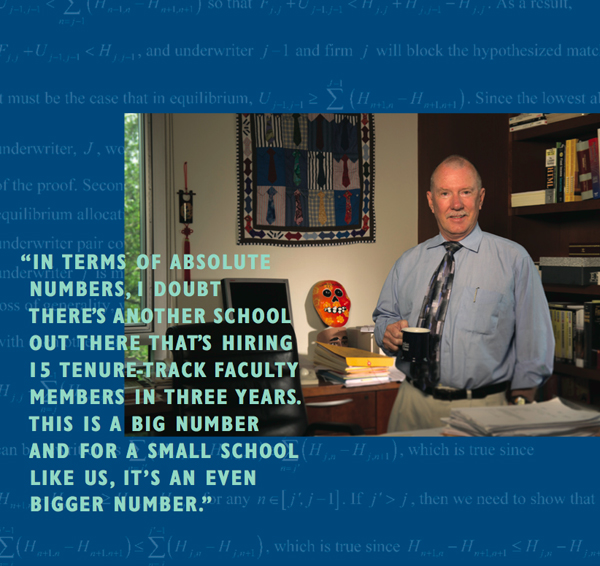
Paul Spindt, senior associate dean and Keehn Berry Chair of Banking and Finance, is overseeing a three-year faculty hiring initiative that will increase the size of the Freeman School’s research-active faculty by 40 percent.
“Everything starts with the faculty,” Solomon says. “Their accomplishments over the last several years, in very difficult circumstances I might add, have been nothing short of miraculous, but given our growing enrollments, those efforts just aren’t sustainable in the long run. At some point you need to take a step back and look at where you are and where you want to go. If we’re going to be a school of choice, we need to grow the faculty and we need to do it now.”
FROM RECOVERY TO GROWTH
The main impetus for the hiring initiative is easy enough to identify. In 2005, in the aftermath of Hurricane Katrina, the Freeman School lost 12 tenured and tenure-track faculty members through a combination of cost cutting and attrition. Over the last six years, as enrollments grew to equal and eventually surpass pre-Katrina levels, the Freeman School has filled its need for additional classroom instructors primarily with professors of practice, non-tenured professors who specialize in teaching.
Part of that strategy was dictated by budget constraints—on a per course basis, professors of practice cost considerably less than tenure-track professors and the university was keeping a close watch on all major expenditures—but according to Venkat Subramaniam, associate professor of finance and a member of the Freeman School’s Executive Committee, another reason was the 2006 revision of the Freeman School’s MBA curriculum.
In the wake of the disaster, the Freeman School introduced an innovative new curriculum to make the MBA program more attractive to returning students, one that put a much greater emphasis on practical skills and experiential learning. The curriculum proved to be a hit with both students and employers, but many of the new courses introduced as a result of the revision— popular courses like Marketing Planning and Implementation, Strategic Consulting, and Energy Fundamentals and Trading— required instructors with significant industry experience, a quality that most young PhD graduates lack.
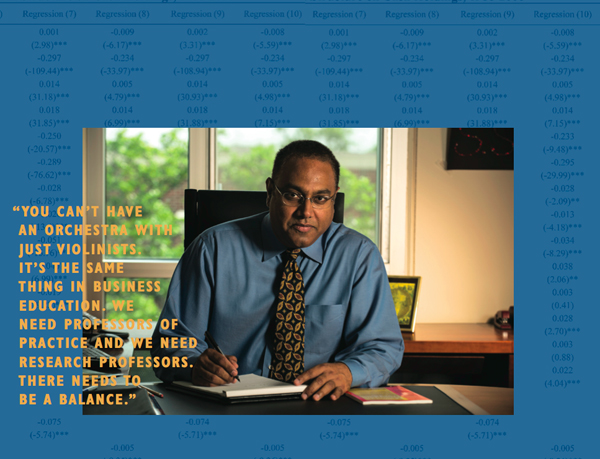
Venkat Subramaniam, associate professor of finance, says the current hiring initiative is essential for the Freeman School to continue to fulfill its mission to be a creator of knowledge.
In part because of the focus on experiential learning, Subramaniam says the business school’s hiring in recent years has tended to focus disproportionately on professors of practice, a focus borne out in the numbers. Prior to Hurricane Katrina, professors of practice and other non-research-active professors comprised just 17 percent of the school’s full-time faculty. By 2010, that number had risen to almost 40 percent.
“Professors of practice play an essential role in delivering our curriculum, but we’ve gone off kilter a little bit over the last several years,” Subramaniam says. “I remember a colleague in the finance field once said you can’t have an orchestra with just violinists. It’s the same thing in business education. We need both. We need professors of practice and we need research professors. There needs to be a balance.”
It’s more than just a need for balance. It’s also a requirement. AACSB International, the organization responsible for accrediting collegiate schools of business, has strict guidelines for schools with missions similar to that of Freeman on the percentage of research faculty required at accredited institutions. That standard, Subramaniam says, exists for a good reason.
“If you think about the school’s mission as a whole, it’s not just the dissemination of knowledge,” he says. “It’s also the creation of knowledge, so research faculty are extremely important.”
Subramaniam isn’t alone in highlighting the importance of research — and research faculty — to the school’s mission and aspirations. It’s a theme members of the Executive Committee return to again and again.
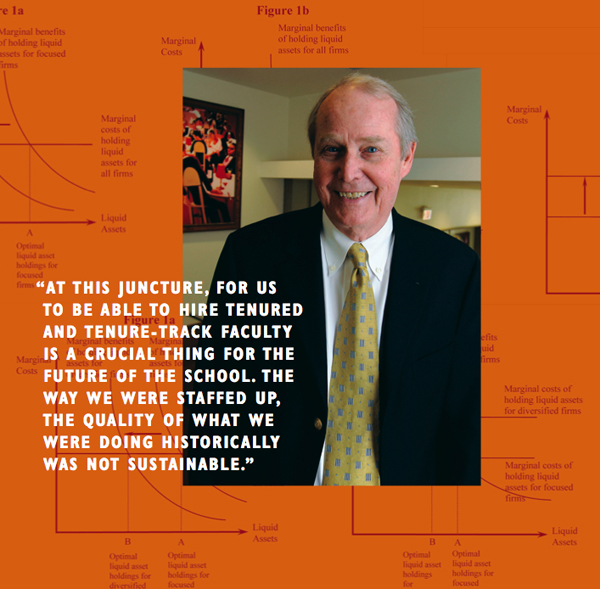
John M. Trapani III, Streiffer Chair of International Business, says the hiring initiative sends an unequivocal message to the academic community that Freeman is a school on the rise.
“We’ve gotten by for six years basically patching things with professors of practice,” says John M. Trapani III, the Streiffer Chair of International Business and executive director of the Goldring Institute of International Business. “In the process of staffing up with professors of practice, we lost some of the research horsepower of the institution because we were substituting teaching faculty for research faculty. At this juncture, for us to be able to hire tenured and tenure-track faculty is a crucial thing for the future of the school. The way we were staffed up, the quality of what we were doing historically was not sustainable.”
A former associate dean, senior associate dean and vice dean, Trapani has played a critical role in Freeman School strategic planning and administration for more than two decades. Trapani knows the inner workings of management education as well as anyone, and he’s excited about the prospect of bolstering the school’s tenured and tenure-track faculty.
“Number one, you’ll get more research output in the aggregate for the school, and that helps you in the rankings,” he says. “Not to mention, you’re going to have more research-oriented faculty teaching, which is a good thing. Those are two big benefits—improving the rankings and improving the value of what we do in the classroom.”
That last topic — the importance of research in the classroom — is one Geoff Parker feels very strongly about.
Parker, professor of management science and director of the Tulane Energy Institute, is one of the Freeman School’s most active researchers. He has over a dozen articles in high-profile journals to his credit, and his work has attracted funding from corporations including Microsoft and SAP as well as the National Science Foundation, the Department of Energy and the state of Louisiana.
“There’s a symbiosis between practice and research,” Parker says. “Professors of practice bring critical experience and industry application to the classroom, and that applied focus often leads students to seek additional core discipline-based knowledge. For example, [professor of practice] Joe LeBlanc has developed some incredibly innovative and engaging simulations in his energy trading courses, and those exercises have led to increased student demand for analytic modeling, statistics and advanced courses based on faculty research.”
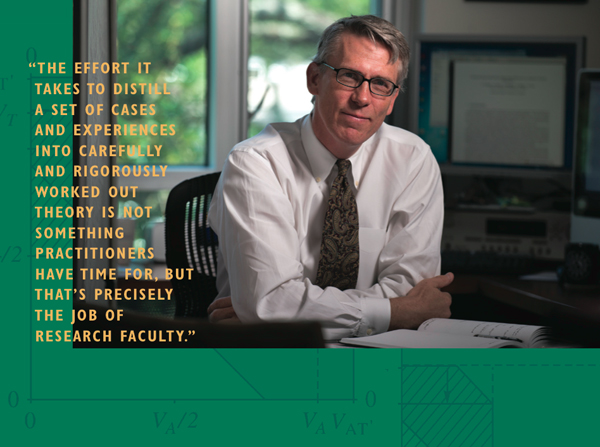
Geoff Parker, professor of management science, says teaching original research in the classroom is one of the ways institutions like the Freeman School distinguish themselves from schools that lack research capacity.
While it’s important to have the industry expertise that professors of practice provide, Parker says it’s also important to have the depth of knowledge and perspective that research faculty bring to the classroom.
“We’re in the business of generating frameworks that allow students to make decisions in an informed way,” he explains. “The effort it takes to distill a set of cases and experiences into carefully and rigorously worked out theory is not something that practitioners usually have time for, but that’s precisely the job of research faculty.”
Throughout his career, Parker has contributed his research not only to scholarly journals such as Management Science and Strategic Management Journal but also to journals such as Harvard Business Review and Sloan Management Review, publications aimed at working professionals and MBA students. Parker says that’s an outgrowth of his belief that academics have a responsibility to make their research available to as wide an audience as possible. One of the best ways to do that, he says, is to teach original research in the classroom.
“I think it’s incumbent that research-active faculty take their best work and figure out some way to bring that into the classroom at all levels, including undergraduate, graduate and executive programs,” Parker says. “Presenting original research is one of the ways we maintain our distinctiveness relative to institutions that don’t have research capacity, and, as a scholar, it’s one of the ways we market test our research to make sure what we’re doing is relevant and accessible to students and working professionals.”
CRITICAL MASS
Historically, the Freeman School has always had a strong reputation for business research, with particular emphasis in the area of empirical corporate finance. Arizona State University’s W. P. Carey School of Business, which tracks finance research, ranked the Freeman School 24th in the world based on the number of faculty publications in the top finance journals between 1999 and 2005, a ranking made that much more impressive by the relatively small size of Freeman’s finance faculty compared to the faculties of similarly ranked schools like Yale, Penn State and the University of California at Berkeley.
“Before Katrina, the finance shop was ranked among the best in the country on the basis of research output,” says Spindt. “Since that time, we’ve tapered off. Even though we’ve had a number of good hires, we’ve had more things going on and so we’ve been devoting more of our time to teaching and service work and getting less done in the way of research.”
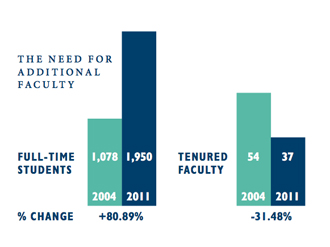
Since 2004, Freeman School enrollment has grown by more than 80 percent while the number of tenured/tenure-track faculty has declined by more than 30 percent.
According to Spindt, that’s already starting to change. In addition to prolific tenured researchers like Parker, Subramaniam, finance professor Sheri Tice and management professor Mike Burke, a number of junior faculty members hired in the last few years have started to emerge as top researchers. Jaideep Shenoy, for example, an assistant professor of finance, has published two articles in top-tier journals in the last two years. Assistant professor of management Carmen Weigelt has published one article and had two accepted for publication in Strategic Management Journal. Daniel Mochon, assistant professor of marketing, has had four well-received papers published or accepted for publication in the last year, and his colleague in the marketing area, assistant professor Janet Schwartz, generated a tremendous amount of media attention with her research article in Health Affairs that suggested giving restaurant customers the option to “downsize” their portions was more effective than posting calorie information in helping consumers to make healthy choices.
“I think people are starting to notice that we’re building up some energy here, but you need a critical mass to really make things work,” Spindt says. “Interactions among faculty members become more effective and individual faculty members become more productive by working with others. To the extent that you can grow your faculty, you spark that critical mass.”
Hiring a large number of faculty members achieves something else as well: According to Trapani, it sends an unequivocal message to the academic community that this is a business school on the rise.
“It creates a buzz in the profession,” Trapani says. “People say, ‘Tulane is finally rebuilding,’ so that sends out a very positive signal, and that can be reflected in the rankings because one of the major inputs to those rankings is the opinions of deans at peer institutions.”
CHANGING FOR A CHANGING ENVIRONMENT
Growing the faculty will enable the Freeman School to do a better job teaching students in the classroom and producing high-quality research, and that in turn will play a big role in boosting the school’s academic reputation and, ultimately, attracting an even higher caliber of students and faculty members. Adding to the talent pool helps create, in the words of Dean Solomon, a virtuous cycle.
But as Spindt alluded to at the beginning of this article, the faculty recruiting effort is about more than staffing classes and increasing research output. It’s also about positioning the Freeman School to compete in a dramatically changing environment. Selecting which areas to grow and which faculty members to hire represents a tremendous strategic opportunity for the business school, and given the historic changes roiling the business education market, Spindt says the stakes are higher than ever.
“Think of the things that are going on,” Spindt says. “You’ve got a lower number of people going into MBA programs. There’s pressure on the technology front in the form of online schools. We’re getting competition from schools in Europe. Schools in Asia are starting to build themselves up. It’s just a very unique time.”
Spindt has seen a lot since coming to the Freeman School more than 20 years ago, but he’s never seen anything like the current environment, and that’s one of the reasons he’s excited by this bold initiative to quickly and dramatically expand the faculty in key strategic areas.
“Tulane has been a reasonably constant organization for a very long time, but now all of a sudden we’re in a situation where that model no longer works,” Spindt explains. “When Ira came here, we faced a point which I don’t know we had really recognized until Ira had the vision to point it out, which is that we had a choice. We either had to do something bold or we were going to become an also-ran in the race, and there’s no fun in being an also-ran.”
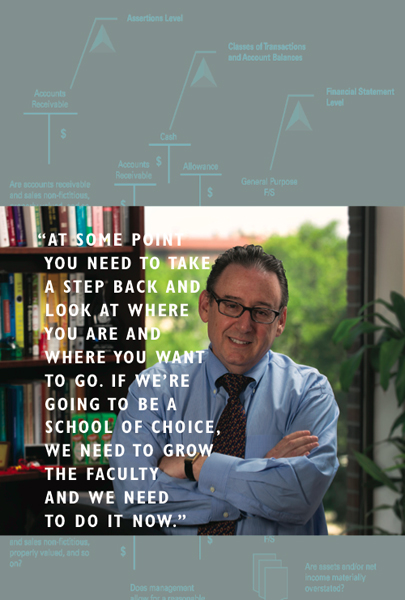
Ira Solomon, dean and Debra & Rick Rees Professor of Business, has made expanding the ranks of Freeman’s research-active faculty his number one priority since becoming dean last year.
When Solomon first interviewed for the dean’s job, he recognized that the initial phase of Freeman’s recovery from Hurricane Katrina was largely complete: The school had survived the disaster, and thanks to the extraordinary efforts of faculty and staff, it had come back even stronger, with more students, more academic programs and a higher profile in the community than ever before.
It was time, Solomon reasoned, for phase two: Strategic growth. After seven years in survival mode, the Freeman School is now in the process of reviewing all its programs and operations to determine the best way to allocate resources. That process is taking place against the backdrop of a rapidly changing management education environment in which many long-held assumptions no longer apply. Enrollment in two-year MBA programs, long considered the flagship program of business schools, is declining whereas interest in one-year graduate programs like the Master of Finance and the Master of Accounting is on the rise. Tapping into that growing market has become one of Dean Solomon’s first strategic initiatives as dean.
Earlier this year, Solomon signed agreements with two prestigious universities in China, Xiamen University and Zhejiang University, to bring up to 75 new Master of Accounting and Master of Finance students to the Freeman School each year. In addition to enhancing the classroom environment with students destined to be among the next generation of leadership in China, revenue from the expanded programs will be used to support faculty salaries as well as improve current programs and launch new initiatives that leverage the Freeman School’s areas of expertise.
According to Spindt, the end result will be a new Freeman School, a bigger, better institution with a national reputation for excellence in a handful of strategic focus areas. In short, a school of choice.
“We’re at a point in history where it’s vital that we put recovery behind us and really think about strategic growth,” Spindt says. “The world is changing around us, and unless we figure out a way to adapt to that change and make ourselves attractive — in other words, find an identity as a school of choice — we are just going to languish. This is something we absolutely have to do, and we absolutely have to succeed at. And we will.”

